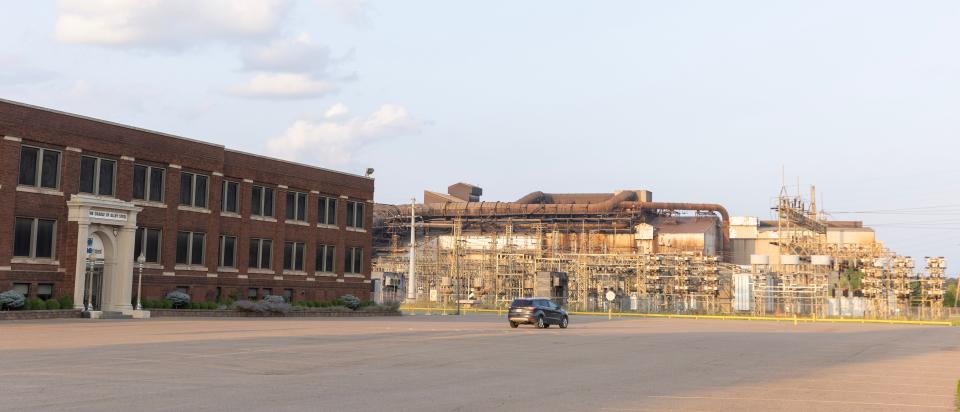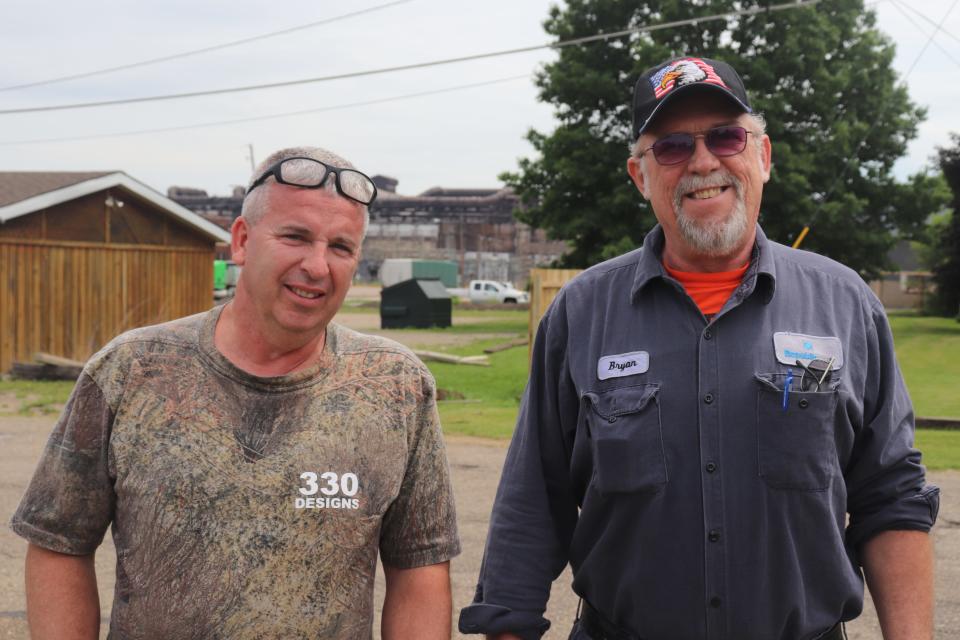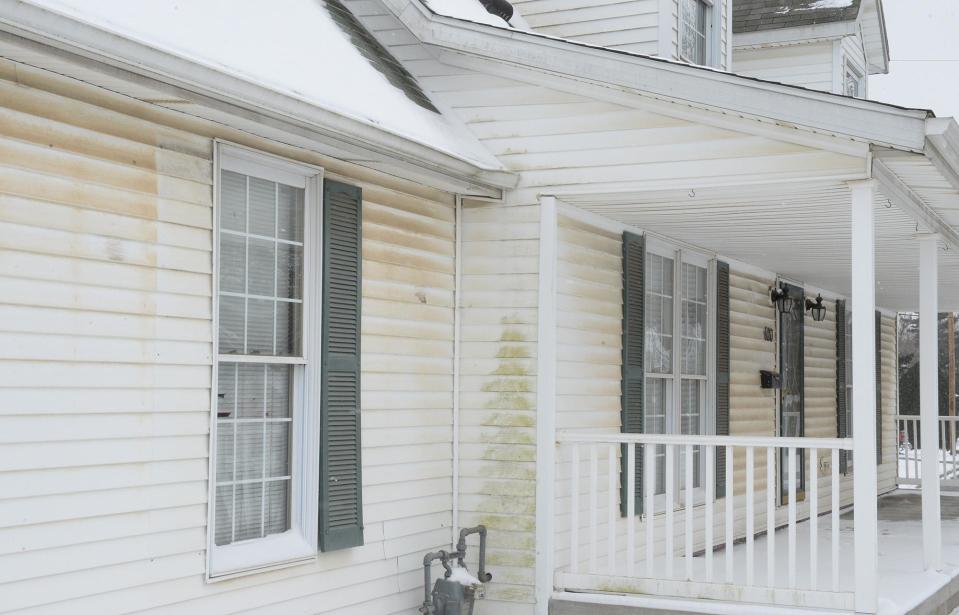Former workers at Republic Steel concerned about lead exposure, long-term health

CANTON − Former Republic Steel worker Anthony Garrison describes himself as someone who's always been relatively healthy. But in March of this year, he began experiencing headaches, nausea and stomach issues.
“My blood pressure couldn’t be controlled, just all kinds of problems," the Mineral City resident said.
For the first time in his 56 years of life, he was anemic. Garrison said his primary care doctor attributed the medical problems to lead poisoning.
Lead is a natural element that can negatively "affect almost every organ and system in your body," according to the U.S. Environmental Protection Agency. It's known to cause cardiovascular issues such as high blood pressure, decreased kidney function, and reproductive problems in adults.
Lead is added to steel to make the alloy more malleable and easy to machine.
Garrison started working at Republic Steel in April 2018 and was transferred to the tripper car in late 2021 after his previous department shut down. In March 2022, he volunteered for his first blood test since starting at the mill because he felt more at risk in the new position.
“Little did I know, that would take us down a really bad road," Garrison said.

Conditions inside the steel mill
Republic Steel, which was headquartered in Canton and owned by the Mexican-based parent company Grupo Simec, abruptly closed its factories in Ohio and New York this August. That left many workers wondering about their long-term health and medical care.
Company representatives and their attorneys did not respond to requests for comment about the closure or working conditions.
Inside the plant at 2633 Eighth St. NE, workers cast lead-infused steel billets that were shipped to Lackawanna, New York, to be finished into coils or bars. The Canton plant was the last producer of leaded steel in the United States and the subject of ongoing scrutiny from the Ohio and U.S. Environmental Protection Agencies.
Former Republic Steel workers described standards far below other factories where they've worked before or after, saying the company neglected cleaning and maintenance. Occupational Safety and Health Administration violation reports tell a similar story.
The most recent are two open OSHA inspections at the Canton plant from 2023 and 2022 and one closed inspection from 2022. They list a total of 17 citations ― many of which are labeled "serious" or "repeat" ― and include:
The washing facilities and restrooms in three work areas "were not maintained in a sanitary condition."
The employer did not provide body wash and towels to employees who were required to shower.
Employees required to wear respirators did not receive annual fit testing.
The employer did not ensure that employees showered and removed their protective clothing at the end of work shifts.
The company did not maintain an accurate record for each employee subject to medical surveillance because of their exposure to lead.
Republic Steel did not implement controls to "reduce employee exposure to lead below the OSHA permissible exposure limit."
The employer did not keep surfaces "as free as practicable" of lead, based on samples taken in September 2022. The citation states, "Employees are not protected from lead exposure during their work shift. Surfaces in employee work areas including, but not limited to pulpits and canteens are contaminated with lead."
According to the open OSHA inspection from 2022, a Republic Steel employee in the tripper car was exposed to 7.6 times the permissible limit of lead (an eight-hour time-weighted average of 50 micrograms per cubic meter of air) on Nov. 8 of that year. Two other employees were exposed to 1.56 times and 1.79 times the permitted amount of lead on the same day.
Garrison said he was the employee in the tripper car that day. The tripper car is a rail car “way up in the top of the building, above the furnace and everything" where one or two people transported materials, he said.
OSHA would not confirm whether it was Garrison in the tripper car, citing the confidentiality of employee names.

Lead in workers' blood and body
Garrison said he was removed from his placement on the tripper car three times between March 2022 and April 2023 because of high levels of lead in his blood. His 26 blood tests, which he shared with The Canton Repository, peaked at 45 micrograms of lead per deciliter of blood (µg/dL) in late March of 2022.
He believes that was the highest level reported at Republic Steel and that he was the first ― but not only ― worker to be removed three times because of blood lead levels.
"By the time we walked out of there, I was probably one of at least four people that had had to be pulled out of their area three times," Garrison said.
Republic Steel's policy was to move workers from their positions when blood lead results were 30 µg/dL or greater, according to employees and an OSHA representative. That is lower than OSHA standards, which require companies to remove an employee from general industry work if a periodic and follow-up blood test is at or above 60 µg/dL or the average of their last three blood tests is 50 µg/dL or greater.
“It was to make them look good with OSHA, saying they was doing more than what OSHA requires," former Local 1200 President Todd Fitzgibbon said. "That was the only thing they did, but they didn’t test on a regular basis. They didn’t clean up the lead.”

OSHA mandates blood tests every six months for workers exposed to an average of at least 30 micrograms of lead per cubic meter of air for more than 30 days a year. However, several employees said the tests offered were voluntary and sporadic.
Andrew Eddy, whose five-year work anniversary was in July, said he only had two or three blood tests during his time at Republic, which involved steelmaking in the ladle aisle and electric arc furnace area. At its highest, his blood lead level was about 19 µg/dL.
“I know there was a lot of people that never went and got lead tests just because they didn’t want to," Eddy said.
Past coverage: The 'inherently dirty' process of making leaded steel in Canton
Carl Conner, who was the maintenance supervisor for about five and a half years, said he took three or four blood tests during that time. His blood lead level results usually were around 10 µg/dL.
Conner said he knew the tests should have been every six months but the company infrequently had them on-site and "you were lucky to get one once a year."
Fitzgibbon, who declined to speak about specific workers, said he knew of about 60 employees who had blood lead results over 15 µg/dL. "There was a bunch" of employees repeatedly removed from their jobs, he added.
“Everybody out there, that worked out there had high lead," Fitzgibbon said. "You’re not supposed to have any lead at all in your body. None.”
Bill Conner, with the United Steelworkers International Union, said the union filed complaints with OSHA, which responded to workers' concerns at Republic Steel.
“Our understanding is the testing, nobody tested in any danger zone," he said. "And in fact, when levels of lead were risen, they were taken out of the department, not allowed to return until they fell below even the threshold provided for OSHA.”

Failures on 'multiple levels'
About two weeks after Garrison's blood test in March 2022, he was in the tripper car when he received a call from a doctor about a missed follow-up appointment. He said Republic Steel did not notify him or remove him after his initial blood lead result of 39 µg/dL.
Garrison's follow-up test on March 25 showed his level had risen to 45 µg/dL, and he was temporarily moved to an outside department. Weekly blood tests followed, and his blood lead level did not fall below 30 µg/dL until late April. Results from less frequent blood tests in the following months were above 20 µg/dL until late September.
“But once I got under 20, I would be sent back up to my area because nobody else wanted to do that job," Garrison said. "I would never make it more than two to three months before my lead levels were back up again."
Garrison and Eddy said lead exposure was a particular problem in the tripper car because once a steel ladle was used, the leftover contents were emptied on the ground below to harden and be reused.
“They’d dump that out and all the smoke and everything goes up in the air, and it would go right up to the tripper car," Eddy said.
Eddy said he hasn't experienced any health issues but is concerned about the effect of lead exposure on him and, potentially, his family. He felt the union tried to improve the workplace and would've liked OSHA and the EPA to conduct "more stringent inspections" or issue fines greater than a "drop in the bucket" to Republic.
Conner said he sometimes feels lethargic but isn't certain that's from lead exposure. He didn't think the union made much of a difference because there wasn't a large membership.
“It was just ridiculous, it really was," he said. "The fact that all of us stayed there is a wonder to any of us, as long as we did.”
Good health insurance, high wages and generous paid time off were reasons why several workers said they stayed despite the conditions.

Garrison said he, with union support, submitted a complaint in 2022 about lead hazards to OSHA, which resulted in several violations. He later reported company retaliation to OSHA after he was laid off in April of this year and dealt with "general mistreatment."
Garrison also had hoped the international union "would step up" and assist him in receiving workers' compensation for medical expenses. He filed a claim earlier this year seeking compensation for permanent partial impairment and is working with NRS Injury Law on the ongoing case.
His current insurance does not cover a toxicology visit, which Garrison said would determine how much lead his bones might have absorbed and if a new medication is needed. In his view, there were failures on "multiple levels" in how the union, OSHA, and EPA responded to Republic Steel.
“I want people to know, not only did they do damage to the neighborhood down there, did they do irreversible damage to peoples’ lives down there, but they did irreversible damage to the employees," Garrison said.
Past coverage: Canton begins planning for new air quality monitoring near Republic Steel
Scott Allen, a spokesman for OSHA, said in an email that the agency would not comment on open investigations. Republic Steel paid past OSHA fines and is on a payment plan through December 2024 for $112,963 owed from the three open inspections.
OSHA's lead standard for general industry was established in 1978.
"In the intervening time, extensive medical research has emerged indicating that adverse health effects can occur in adults with lower BLLs than previously recognized and at levels well below the medical removal level (≥ 60 µg/dL in general industry, ≥ 50 µg/dL in construction) and return-to-work status level (< 40 µg/dL) specified in both standards," Allen said. "OSHA is continuing to review these triggers for medical removal and return-to-work."
Last year, OSHA requested input about reducing its lead standards and is reviewing the comments and information received. But before any rule change, Allen added, the agency would need to publish a proposal, "if OSHA deems such action appropriate."
Reach Kelly at 330-580-8323 or kelly.byer@cantonrep.comOn X, formerly known as Twitter: @kbyerREP
This article originally appeared on The Repository: Former workers at Republic Steel share concerns about lead exposure

